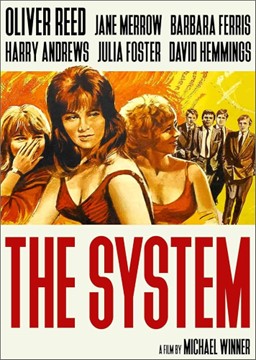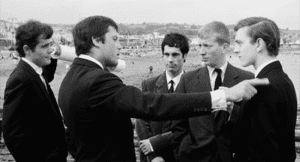For anyone who hasn’t seen The System on the Big Screen, The Silver Screen Film Club is showing the movie, with an introduction by Dr Kevin Dixon, at The Royal Lyceum, Abbey Road, Torquay, TQ2 5NQ on Thursday 10th October at 1:30. Tickets are £4.50.
Dozens of films and TV shows have been made in Torbay over the years. Some have been average, some haven’t been that great, and a few have been outstanding.
Arguably the best was a movie made back in 1964. It made an impact locally, nationally and internationally, was an early showcase for later Sixties icons, and a training ground for its young director and cinematographer. It also gave a good number of residents their few minutes of fame as extras.
That movie was The System. Written by Peter Draper, The System is the story of a group of jacket-and-tie clad young men scouring Torquay’s seasonal tourists in search of sexual conquests. Near the end of yet another resort summer, Tinker, played by Oliver Reed, aims to seduce an affluent fashion model, but finds himself unexpectedly falling in love. Maybe it’s not always the tourists who are being exploited.
Written by Peter Draper, The System is the story of a group of jacket-and-tie clad young men scouring Torquay’s seasonal tourists in search of sexual conquests. Near the end of yet another resort summer, Tinker, played by Oliver Reed, aims to seduce an affluent fashion model, but finds himself unexpectedly falling in love. Maybe it’s not always the tourists who are being exploited.
The narrative plays out to a Sixties soundtrack that includes The Searchers, The Rocking Berries and The Marauders. The System was released just three months after ‘A Hard Day’s Night’ and it was rumored that The Beatles were to be featured. The Bay’s place in music history would have been very different if they had made an appearance.
The System offers an interesting segue between two generations of British cinema. The social realism ‘Kitchen Sink’ dramas of the late 1950s and early 1960s had angry young men disillusioned with modern society. Their depiction of, often Northern, working-class life explored controversial social and political issues in movies such as A Taste of Honey, This Sporting Life, Saturday Night and Sunday Morning, and A Kind of Loving.
By the mid-Sixties the focus had shifted from the North and back to ‘Swinging London’, showcasing radical changes in social and sexual politics. Such a cultural revolution was expressed in A Hard Days Night, Blowup, and Alfie. 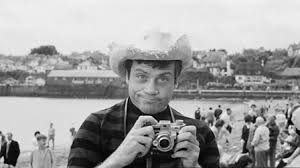 Filmed in black and white, The System was a blend and a bridge from that social realism to a peculiarly British escapism, though with its protagonists still constrained by class and social expectations in the ‘Little London’ of Torquay.
Filmed in black and white, The System was a blend and a bridge from that social realism to a peculiarly British escapism, though with its protagonists still constrained by class and social expectations in the ‘Little London’ of Torquay.
By both reflecting and exaggerating the liberated lifestyle of Torquay’s youth, for years The System attracted the young and countercultural to the resort. The myth was of a kind of Devonian San Francisco, an alternative, albeit chillier, lifestyle by the sea.
Indeed, the movie explored and proclaimed the liminal and transgressive nature of what the resort had become in the post-War period; a two-week escape from the repressed and mundane. In its review, The Monthly Film Bulletin points out “the reputation English girls have for breaking out of their tight moral shells and turning into amoral chicks when on holiday.”
From another gender perspective, The Radio Times noted the lure of the seaside while also recognising that times were a-changing: “Once upon a time, teenage boys used to go to the unromantic English seaside to pick up their girls, before cheap air travel to the Costa Brava was introduced”.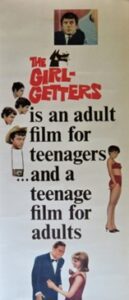 For the time it was made, the film had some risqué and provocative content. It showed shenanigans before marriage, included a long shot of a naked female, women in strong roles, criticism of traditional marriage, and a hint at an abortion. All this proved a little too controversial for our American cousins who renamed the movie as ‘The Girl Getters’ in the States where it was heavily cut and marketed as adult entertainment.
For the time it was made, the film had some risqué and provocative content. It showed shenanigans before marriage, included a long shot of a naked female, women in strong roles, criticism of traditional marriage, and a hint at an abortion. All this proved a little too controversial for our American cousins who renamed the movie as ‘The Girl Getters’ in the States where it was heavily cut and marketed as adult entertainment.
The film’s dircdetor was Michael Winner, best known for the questionable vigilante movie Death Wish. He can be seen in a Hitchcock-type cameo appearance as the train arrives at Torquay Station.
The cinematographer was Nicolas Roeg, notable for The Masque of the Red Death, Performance, Walkabout, and The Man Who Fell to Earth.
The scene where Julia Foster is seen dressing after spending the night with Tinker may have been the inspiration for the post-coital montage with Julie Christie and Donald Sutherland in Roeg’s Don’t Look Now.
We have the movie to credit for introducing the English language to a new noun, the grockle, a mildly insulting term for tourist. Here’s Oliver Reed pointing out a grockle to David Hemmings.
Despite claims that this was an old English word, the Oxford English Dictionary knows of no instances from before the release of the movie. One suggestion is that it originates in a Dandy cartoon, Danny and his dragon, Grockle.
A Torquay local claimed that, when he had a summer job at a swimming pool, he named an elderly lady swimmer the Grockle. It then became a name for all tourists among a few locals. When a scriptwriter heard the term during filming in the Bay, he incorporated the genus into Tinker’s monologue on Paignton beach. This then caused grockle to be heard worldwide as a term for any irritating tourist.
Notably, the movie was early in the Sixties screen careers of many of its cast.
Tinker was played by 26-year-old Oliver Reed who, after appearing in Hammer Horror films, went on to star in Oliver, Women in Love, Hannibal Brooks, The Devils, and Tommy. His partnerships with Michale Winner and Ken Russell brought Oliver fame though he was also known for hellraising and heavy drinking.
Co-star Jane Merrow starred in Night of the Big Heat, The Lion in Winter, and Hammer’s Hands of the Ripper. She was cast as Lorna Doone in a BBC adaptation and also appeared in TV series such as Danger Man, The Saint, The Prisoner, Gerry Anderson’s UFO, and Randall and Hopkirk (Deceased). After a part in The Avengers, she was considered as the replacement for a departing Diana Rigg, though the role went to Linda Thorson.
Tinker’s protégé in the film was played by David Hemmings, one of the great cinema icons of the Sixties, perhaps best remembered as the trendy fashion photographer in Blowup.
One of Tinker’s conquests is played by Julia Foster who later appeared in Half a Sixpence. Foster replaced Julie Christie who was intended to be in the film, but she had to withdraw; another presence that would have guaranteed the movie’s place in the Sixties movie pantheon.
Less acknowledged in the cast list is Talitha Pol who played German tourist Helga – pictured on the left.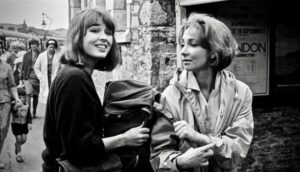 Actress, socialite, and model, Talitha was at the centre of the Swinging Sixties scene and friends with Mick Jagger. In 1966 she married John Paul Getty Jr, son of the oil tycoon Paul Getty. However, by 1969, she was being treated for heroin and alcohol addiction.
Actress, socialite, and model, Talitha was at the centre of the Swinging Sixties scene and friends with Mick Jagger. In 1966 she married John Paul Getty Jr, son of the oil tycoon Paul Getty. However, by 1969, she was being treated for heroin and alcohol addiction.
She was the stepmother of 16-year-old John Paul Getty III who was later kidnapped and held for ransom by the Italian mafia, a story told in the 2017 movie All the Money in the World. On 11 July 1971 Talitha was found dead in the Getty apartment in Rome from a heroin overdose. She was 31.
Additional Sixties movie faces include Barbara Ferris (Interlude), Ann Lynn (Baby Love), and Harry Andrews (The Hill) as Tinker’s cynical boss.
The other great pleasure in viewing The System is to spot the locations.
In a fight scene between Tinker and a gang of rival photographers, we have The 400 Club and Torquay harbourside. Then there’s: The Pavilion; The Palm Court Hotel; Churston Railway Station; Brixham Harbour; Paignton Beach; and Paignton Harbour, the location of Tinker’s apartment. Further afield is Dartmouth, Slapton Sands and the abandoned village of Hallsands.
The movie’s climax features a melancholy end-of season beach party where effigies of a bride and groom are ceremonially burnt. Filmed at Elberry Cove, it’s at the parade and around the pyre that Torbay’s locals got their chance as extras.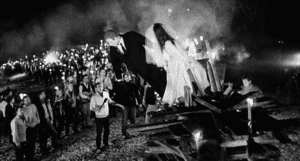
The System on the Big Screen, with an introduction by Dr Kevin Dixon, is being shown at The Royal Lyceum, Abbey Road, Torquay, TQ2 5NQ on Thursday 10th October at 1:30. Tickets are £4.50.
Torquay: A Social History’ by local author Kevin Dixon is available for £10 from Artizan Gallery, Lucius Street, Torquay, or:
https://www.art-hub.co.uk/product-page/torquay-a-social-history-by-kevin-dixon


